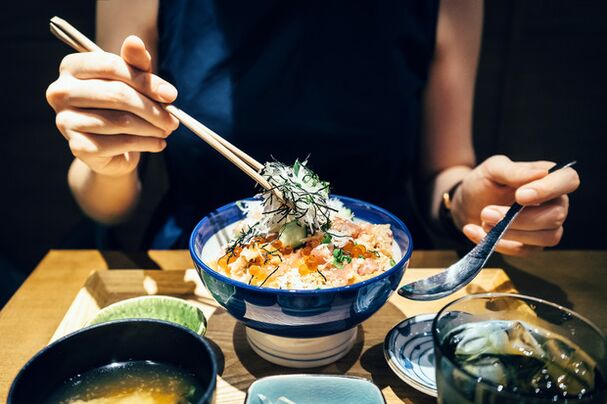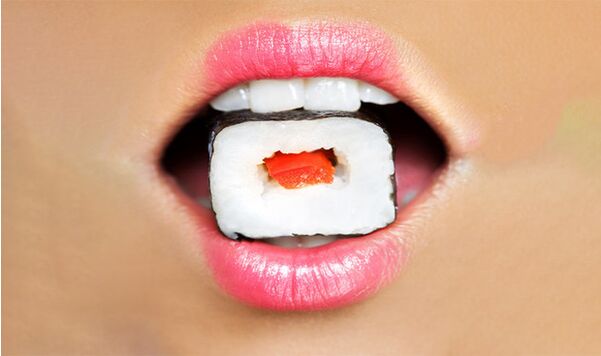The Japanese are famed for harmonious physics and life expectancy, in many ways, this is due to the diet.Editors have appealed to the candidate for medical sciences, sports medicine and sports diet, with an expert dietel on fitness clubs to get acquainted with all the features of the diet.
The essence of a Japanese diet is to launch metabolism.You have to clearly follow the menu, during the day or without changing the product, you are clearly observing the rules of cooking.This diet can be called Besolev precisely because you drink a lot and not consume salt foods, kilograms are literally washed.

The diet is based on the growth of proteins in the diet and the restriction of fats and carbohydrates.The basis of your menu should be fish, chicken, beef, eggs, cheese and kefir, with a low percentage of fat content.Vegetables are not prohibited in moderate amounts of fruit.A list of what to give up is much broader like any diet.
Forget salt, sugar, spices (they eat more than you need hunger), leave the store smoked meat, bread, bananas and grapes.
A Japanese woman, as a loving diet, is threatened with dehydration, so it is especially important to drink at least 2 liters of water per day during these 14 days.
You don't have to be hungry at the expense of protein - it is well saturated, allowed cheese will give the required minimal fat body, and vegetables - fiber and carbohydrates.
The Japanese diet menu is designed for a week, after which it is planned to repeat the days already received.Diets are strictly prohibited from snacks and any deviation from the suggested menu, otherwise the result will be far away.
Whatever they promise
Duration of Japanese diet: From 7 to 14 days.No more!
How much can you throw away: Up to 8 kg.
Features: Available.
Disadvantages of Japanese diet:A very strict diet, it is difficult to withstand and not break.
Some experts argue that the Japanese diet improves metabolism for up to two years, ie it will suffer for two weeks, and the result will take a long time.
Nutritional properties of Japanese residents
Japan is a country of long individuals.The average life expectancy of women is 87 years and this is more than in any other country in the world.What is the reason for such an incredible life expectancy?Researchers believe that the cause is generally lifestyle and especially in food culture.

First, the food in Japan is cooked, stewed and evaporated, but it is not roasted in large amounts of oil.This radically distinguishes Japanese cuisine from the west and even from Chinese, in which all dishes are very fat.
Secondly, the Japanese diet is a multitude of new seasonal products with different color products.Thus, the principle of diversity creates the basis for the healthy eating of the Japanese.
Third, the size of the Japanese is small, and they are radically different from the population of other states.In Japan, desserts are much smaller than the traditional Western and huge portions used by the population of some countries (for example, 400 grams of pig kebabs) is completely unacceptable to the Japanese.
Japanese diet underwater stones
"The problem is that the Japanese diet has nothing to do with Japanese-type nutrition," explains the expert-dietary-acetate legend, and a diet was created at a certain Japanese clinic.However, there is no description of this clinic or its address on any English or Russian site.At the same time, in the name of this clinic, you can find more than a thousand monotonous texts with a Japanese diet description.Nevertheless, it relies on my medical experience, I can convincingly say that there is no Japanese diet.I will justify my position.
- The Japanese diet is a low-calorie diet designed for 7-14 days.During this time, you can really throw a few pounds, as any strict restrictions during eating cause weight loss.However, fatty tissue is not only an additional substance, but also the most important endocrine organ.Saving a few kilograms sharp is fertilized by the imbalance of hormonal regulation of metabolism.
- This is a low carbon diet.However, carbohydrates along with proteins and fats are an important component of nutrition.Moreover, carbohydrates are a source of energy that we use daily for both mental and physical work.An alternative source of energy does not contain fats in the Japanese diet.
- This is a diet that does not essentially provide breakfast because it is difficult to call black coffee or vegetables for breakfast.At the same time, breakfast is a major meal that we get for all the necessary components of nutrition (proteins, fats and carbohydrates) for adequate functioning in the first half of the day.
- This is eventually a diet.Any restriction -based diet does not take into account the rules of food behavior and a healthy diet.Subsequently, it results in the fact that the classic mechanism "weight gain starting on a diet - becomes better after the diet."
Thus, this is not much different from other diets that do not have a decent justification: they are united with slogans that provide a rapid loss of 10 kg per week and at the same time do not take into account the effects of a sharp loss of weight for human health.
In any case, preparations for the diet should be thorough, it is best to consult your doctor before going to Japanese food.You can try such a diet if you have no contraindications: pregnant women, nursing mothers, liver disease, kidneys, gastritis and ulcer should not go to such a severe diet.

Japanese diet a day
The first day
Breakfast: Black coffee (always without sugar and milk).
Dinner: 2 solid shrub eggs, boiled cabbage salad (vegetable salads are seasonal with vegetable oil) and a glass of tomato juice.
Dinner: 250 g of bent or fried fish.
The second day
- Breakfast: Black coffee and a slice of rye bread.
- Dinner: 250 g of bent or fried fish, boiled cabbage salad.
- Dinner:100 g boiled beef and a cup of kefir.
The third day
- Breakfast: Black coffee and a slice of rye bread.
- Dinner: Large zucchini fried vegetable oil.
- Dinner: 2 solid stomach eggs, 200 g of mediocre -cooked beef, raw cabbage salad.
The fourth day
- Breakfast: Black coffee.
- Dinner: 1 egg, 3 carrots and 15 g of cheese.
- Dinner: 200 g fruit.
The fifth day
- Breakfast: Grated carrots with lemon juice.
- Dinner: 200 g boiled or fried fish and a glass of tomato juice.
- Dinner: 200 g any fruit.
The sixth day
- Breakfast: Black coffee.
- Dinner: 400 g of senseless cooked chicken, fresh cabbage and carrot salad.
- Dinner: 2 eggs screw and fresh carrots.
The seventh day
- Breakfast: Tea.
- Dinner: 200 g of barren boiled beef, 200 g of fruit.
- Any previous dinner.
There are many contraindications to this diet, starting with gastric diseases before adolescence or pregnancy, so before using it before consulting a doctor.
The eighth day
- Breakfast:Black coffee.
- Dinner:500 g of bent unsuccessful chicken and salad carrots and cabbage.
- Dinner: Fresh carrots and 2 boiled eggs.
The ninth day
- Breakfast: Grated carrots with lemon juice.
- Dinner: 200 g boiled or fried fish and a glass of tomato juice.
- Dinner: 200 g fruit (you can make salad).
The tenth day
- Breakfast: Black coffee.
- Dinner: 3 boiled carrots, 1 boiled eggs and 50 g of cheese.
- Dinner: 200 g fruit.
Eleventh day
- Breakfast: Black coffee and a slice of rye bread.
- Dinner: Large zucchini fried vegetable oil.
- Dinner:200 g boiled beef, 2 solid stomach eggs and fresh cabbage salad.
Twelfth day
- Breakfast: Black coffee and a slice of rye bread.
- Dinner: 200 g cooked or fried fish with fresh cabbage salad.
- Dinner: 100 g cup of boiled beef and kefir.
The thirteenth day
- Breakfast: Black coffee.
- Dinner: 2 boiled eggs, boiled cabbage and a glass of tomato juice.
- Dinner: 200 g cooked or fried fish.
The fourteenth day
- Breakfast: Black coffee.
- Dinner: 200 g cooked or fried fish, fresh cabbage salad.
- Dinner: 200 g cup of boiled beef, kefir.
































